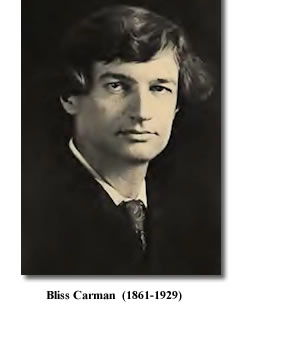BLISS CARMAN (1861-1929)
by Jordan Bera
"The best poetry," Bliss Carman wrote in his 1903 essay, "Subconscious Art," "addresses the mind and emotions." Heralded by his peers as the "unofficial poet laureate of Canada," Carman is, indeed, one of Canada's best and most celebrated poets. Not only is his poetry thought-provoking and pleasing to read, but it also appeals to the reader's emotions through its use of mystical, picturesque, and transcendent images of nature.
William Bliss Carman was born on April 15, 1861 in Fredericton, New Brunswick, into a family with deep literary roots. His mother was a descendant of Daniel Bliss, the great-grandfather of Ralph Waldo Emerson, and his cousin on his mother's side was "the Father of Canadian Literature" Charles G.D. Roberts. Along with his cousin, Carman received a classical education at the Fredericton Collegiate School and the University of New Brunswick.
In 1881, he continued his studies in physics, mathematics, and philosophy at Edinburgh University. After two years in Scotland, he returned to Canada in 1883, contemplated a career in law or engineering, but instead went to Harvard where he studied English literature and philosophy. At Harvard, Carman was heavily influenced by the works of the American transcendental poets, and his ancestor Emerson's belief that God's "truth" can be intuitively experienced through nature and natural settings is the immediate inspiration for one of Carman's best known poems, "Vestigia":
And even as I marvelled how
God gives us Heaven here and now,
In a stir of wind that hardly shook
The poplar leaves beside the brook –
His hand was light upon my brow.
In order to financially support his desire to become a professional poet, Carman worked as a journalist and editor for a variety of Canadian and American magazines from 1890 to 1898. His first book of poetry, Low Tide on Grand Pré, was published in 1893 to enthusiastic reviews, and was named for a poem inspired by the Evangeline country in Nova Scotia, near Windsor, where Carman often visited with his cousin Roberts. Carman's literary breakthrough came with the publication of Songs from Vagabondia (1894), More Songs from Vagabondia (1896), and Last Songs from Vagabondia (1900). In the Vagabondia series, Carmen and his collaborator Richard Hovey (a close friend from Harvard), explore spiritual and emotional states that are only obtainable through a personal, transcendent relationship with nature.
Carman wrote prolifically over the next thirty-five years, producing approximately thirty volumes of poetry and prose. This includes the five-volume The Pipes of Pan, in which much of his best-known poetry appears, and numerous essays on art and its relationship to nature and human life. From 1919 to 1920, Carman suffered from tuberculosis, but when he recovered he embarked on an extensive tour of Canada and the United States giving readings and public lectures. In 1928, the Royal Society of Canada awarded him its Lorne Pierce Medal for his contribution to Canadian poetry. Although Carman died at the age of 68 in New Canaan, Connecticut, his ashes were buried in a suitable place for a poet who believed that man is most at peace in nature – a man who is still celebrated to this day as one of Canada's most beloved nature poets – the Forest Hill Cemetery, in Fredericton, New Brunswick. |

